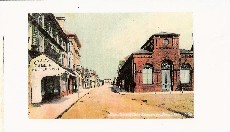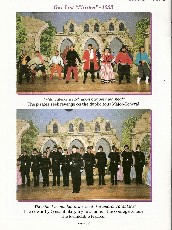| |
 
HI-LIGHTS AND
OPERATIC SOCIETY MERGE
 |
|
So now we
know. After months of rumour
and speculation the programme for the
recent Hi–Lights production of
Calamity Jane revealed that the Society
had merged with the Petersfield Operatic
Society.
The move had become inevitable as
most of the membership was common to
both, and for the past few years they had
shared the same producer and musical
directors. In fact the only
real difference appeared to be that the
Operatic Society restricted itself to the
works of Gilbert and Sullivan and the
Hi-Lights performed a wider repertoire,
though in recent years this had become
confined to large-scale musicals at the
expense of Viennese operetta and English
musical comedy. |
For eighty-five years
the Petersfield Operatic Society had existed on a
diet of Gilbert and Sullivan, with just a single
exception, The Beggar’s Opera in 1956,
though this was followed later the same year by
The Yeomen of the Guard.
Strangely enough, The Beggar’s Opera was the
first production I saw, and Jean Hick still
enjoys telling the story of how she and other
young members of the company were not allowed to
take part, as it was considered too bawdy for
them. Instead they sold oranges
in the foyer!
As with so much in Petersfield, the
earliest days of the Society had a strong Bedales
connection The inaugural HMS
Pinafore in 1922 was produced by Moray Williams
and featured Steuart Wilson as Ralph
Rackstraw. Both taught at the school
and were to become famous, Williams as an
archaeologist and Wilson as a tenor and musical
administrator. The musical director
was Percy Whitehead, Professor at the Royal
College of Music and a pillar of the Petersfield
Musical Festival during the 1920s, who kept the
Music Studio at the bottom of the High Street for
many years. Performances were given
in the Corn Exchange, the front of which is now
Cubitt and West’s, facing the
Square. Two years later The
Gondoliers was dominated by two great figures
from the Arts and Crafts Movement, Edward
Barnsley and Basil Gimson.
Further
performances were given until 1927, when
the Hall was converted into retail use,
and not revived until nine years later,
by which time the Town Hall had been
built. Iolanthe, The Mikado
and Ruddigore were performed there until
war interrupted and there was another
break, of twelve years this time.
So, in 1950, began an uninterrupted
series of distinguished
performances. Basil Gimson
was still around to produce and Tim
Warden Lane, almost inevitably, was the
conductor. Three years later
production duties were undertaken by
Anthony Gillingham, a Bedales teacher who
had enjoyed a distinguished naval
career. I remember his
outstanding baritone voice and a
magnificent stage presence, often
alongside Leonard Springate.
He and Tim Lane remained at the helm
until 1969, and it was during this period
that several new singers emerged, who
were to serve the Society well for many
years, including Diana Harding, Eunice
French, Kenneth Hick and Stuart
Dandridge. |
|
 |
In 1970 a new team took
charge. Michael Hurd, a well-known
composer, broadcaster and authority on English
music, was joined by Michael Harding, who had
already sung leading bass parts, as
producer. In the course of their
thirty years they staged the entire Gilbert and
Sullivan canon, including such rarities as The
Grand Duke and Utopia Ltd., and although every
production remained largely traditional,
standards were high enough to receive a variety
of awards. All these productions were
greatly enhanced by first, David
Stevenson’s, and later Andy Tubbs’s
spectacular settings.
 |
|
In recent
years, however, the Operatic Society and
the Hi-Lights, which were founded by
Kenneth Snuggs and Rosemary Swan in1968,
appear to have grown closer together,
sharing producer (the admirable Roger
Wettone, whose up-dated Pirates of
Penzance in 2003 remains a vivid memory,)
and musical director. The
number of Gilbert and Sullivan operas
which can attract a modern audience, yet
alone draw in young performers, has
fallen to about six, and it may indeed no
longer be viable to stage one every
year. So perhaps the merger
was inevitable.
But one thing is
certain. The new, enlarged
company, as yet I believe without a name,
will emerge stronger and more vibrant,
and if some young men can be found to
complement the wealth of female talent
available, we can look forward to some
fine entertainment in the coming years.
Tom Muckley, June 2008
|
This article was originally
published by the
Petersfield Post
tommuckley.co.uk
|
|




